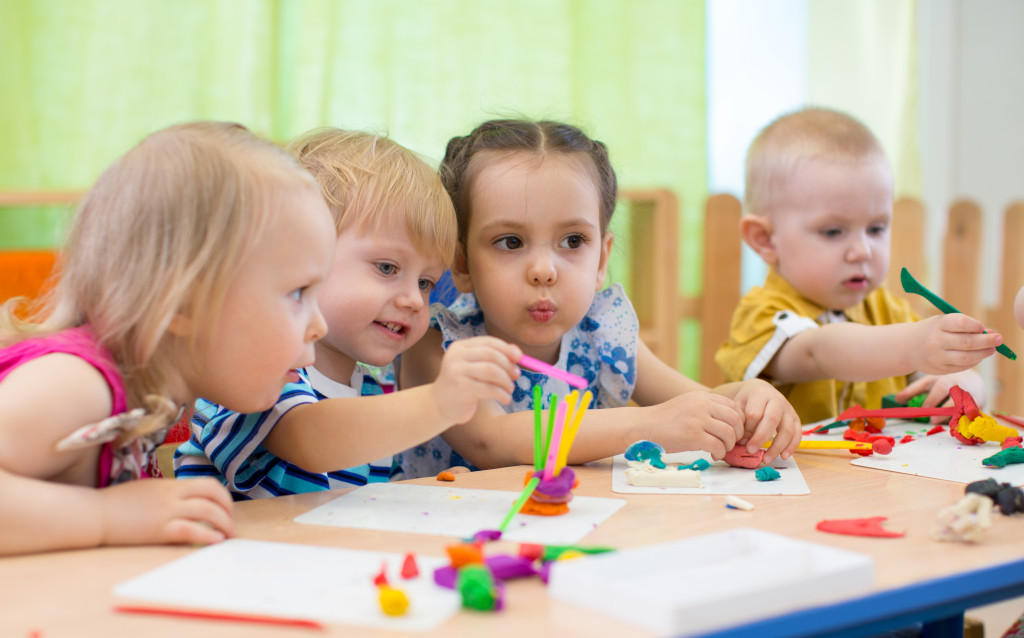- Child development is a continuous process that includes five stages from infancy to adolescence.
- To prepare your toddler to transition to preschool, create an environment where they are inspired to learn and practice social skills with other children.
- Introduce them to activities like circle time and snack time, read books about school, and encourage independence in the classroom.
- Visit the preschool facility beforehand and talk to them about all the fun activities they will be doing.
Parents are constantly preparing for their child’s next stage of development, and the transition from toddler to preschooler is perhaps one of the most significant changes. This can be a time of big emotions, growth, and plenty of challenges for parents and children.
As a parent, you want your children to reach their full potential and thrive in a structured environment. This is where preschool comes in – socially and academically preparing young children. But how do you prepare your child for this great leap? How do you transition them from babyhood to the more structured world of preschool? Here’s your guide.
What is Child Development
Child development refers to the series of changes that a child goes through from infancy to adolescence. As a parent, guardian, or teacher, understanding the stages of child development can help you to provide appropriate support, care, and guidance to your child. Child development refers to changes in a child’s biological, psychological, and social aspects. It’s a continuous process divided into five stages essential to understanding child growth and development.
Primary Stages of Child Development

There are five primary stages of child development, as discussed by developmental psychologists. These are:
- Infancy (birth to 18 months): A baby learns and develops on many levels during infancy. This includes physical, cognitive, social-emotional, language, and perceptual skills.
- Early Childhood (18 months to 3 years): As children enter early childhood, they become more independent and form relationships with others. They learn through play and exploration in their environment and by using language to express themselves.
- Preschool (ages 3 to 5): At the preschool stage, children learn how to interact with their peers and participate in organized activities. They also begin to develop problem-solving skills and gain an understanding of cause and effect.
- Middle Childhood (ages 6 to 12): Children learn to think logically and become more independent during middle childhood. They also start school at this stage, introducing them to academic education and increasing socialization with their peers.
- Adolescence (ages 13 to 18): Children learn to be independent adults during adolescence. This is a time of physical and mental growth, exploration, and experimentation with their newfound freedom.
Transitioning a Toddler
Preparing yourself and your toddler for the transition to preschool is integral to this process. Toddlers are naturally curious and learn best through active exploration and play. Providing them with opportunities for both is important, as this will prepare them for a more structured preschool environment.
Commence the Preschool Learning Attitude Early On
A toddler must have a learning attitude early enough to transition to preschool successfully. Parents can create an environment where the child gets inspired to learn by exposing them to books, educational toys, and fun activities.
You can also enroll your child in a childcare center as early as two or three years before preschool, which will help them to adjust to the more structured environment once they start school. Childcare centers are great places for toddlers to learn, explore, and interact with other children in a supervised setting.
Practice Social Skills at Home
At home, please encourage your child to build on their social skills by organizing playdates and activities that involve other children. These activities teach them essential social skills such as sharing, conversation, taking turns, and problem-solving. Through these interactions, they learn to adjust and adapt to new social settings, which is crucial when transitioning to a preschool setting.
Prepare Your Child for the Structure of Preschool

Sometimes the biggest challenge for toddlers transitioning to preschool is adapting to the new routine. To adequately prepare your toddler, create a way that mimics what happens in preschool.
Introduce them to activities like circle time and snack time to help them get used to following a schedule. Reading books about school, and practicing skills like taking off their shoes and putting on a jacket independently, can also give them a sense of independence in the classroom.
Visit the Preschool Beforehand
Before your child starts preschool, schedule a visit to the facility beforehand. This allows them to explore the new environment and become familiar with the classroom setting. It also ensures that they are already familiar with their new surroundings, which can help alleviate any fears and anxieties. It’s a good idea to talk about the preschool and all the fun activities they will be doing to get them excited and comfortable with the idea of attending.
Final Thoughts
Transitioning from toddler to preschooler is a significant milestone, and as a parent, you must ensure your children have the tools to embrace it with ease. Preparation is always crucial, so equip your toddler with the necessary skills to be successful in their new learning environment. With these tips, you can help your toddler transition smoothly to preschool.






